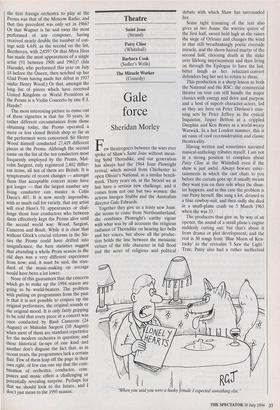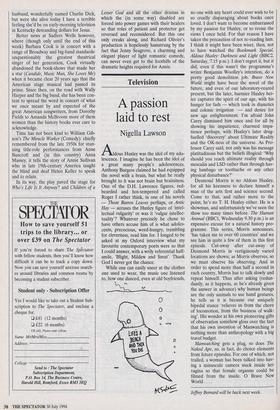Theatre
Saint Joan (Strand) Patsy Cline (Whitehall) Barbara Cook (Sadler's Wells) The Miracle Worker (Comedy)
Gale force
Sheridan Morley
Few theatregoers between the wars ever spoke of Shaw's Saint Joan without mean- ing Sybil Thorndike, and our generation has always had the 1964 Joan Plowright revival, which moved from Chichester to open Olivier's National, as a similar bench- mark. Thirty years on, at the Strand we at last have a serious new challenge, and it comes from not one but two women: the actress Imogen Stubbs and the Australian director Gale Edwards.
Together they give us a feisty new Joan: she seems to come from Northumberland, she combines Plowright's earthy vigour with what was by all accounts the religious radiance of Thorndike on hearing her bells and her voices, but above all the produc- tion holds the line between the messianic virtues of the title character in full flood and the acres of religious and political debate with which Shaw has surrounded her.
Some tight trimming of the text also gives us two Joans: the warrior queen of the first half, sword held high as she raises the siege of Orleans and changes the wind in that still breathtakingly poetic riverside miracle, and the shorn-haired martyr of the second half, choosing death at the stake over lifelong imprisonment and then living on through the Epilogue to have the last, bitter laugh as her reluctant-convert defenders beg her not to return to them.
This production is a sharp lesson to both the National and the RSC: the commercial theatre on tour can still handle the major classics with energy and drive and purpose and a host of superb character-actors, led as they are here on Peter Davison's stun- ning sets by Peter Jeffrey as the cynical Inquisitor, Jasper Britton as a crippled Dauphin and Ken Bones as a world-weary Warwick. In a hot London summer, this is an oasis of cool reconsideration and classic theatricality.
Having written and sometimes narrated musical-anthology tributes myself, I am not in a strong position to complain about Patsy Cline at the Whitehall even if the show is just awful. Always beware enter- tainments in which the cast chats to you before the curtain goes up: it usually means they want you on their side when the disas- ter happens, and in this case the problem is our Patsy herself. She sang a lot, dressed in a blue cowboy-suit, and then sadly she died in a small-plane crash on 5 March 1963 when she was 33.
The producers thus give us, by way of an opener, the sound of a small plane's engine suddenly cutting out: but that's about it from drama or plot development, and the rest is 30 songs from 'Blue Moon of Ken- tucky' to the revivalist 'I Saw the Light.' True, Patsy also had a rather ineffectual "When you said you were a husky female I expected something else." husband, wonderfully named Charlie Dick, but were she alive today I have a terrible feeling she'd be on early-morning television in Kentucky demanding dollars for Jesus.
Better news at Sadlers Wells however, where (though only until the end of this week) Barbara Cook is in concert with a range of Broadway and big-band standards: unquestionably the greatest theatrical singer of her generation, Cook virtually abandoned the book-shows that made her a star (Candide, Music Man, She Loves Me) when it became clear 20 years ago that the American stage musical had passed its prime. Since then, on the road with Wally Harper and the big band, she has been con- tent to spread the word in concert of what we once meant by and expected of the great American songwriters, from Dorothy Fields to Amanda McBroom more of them women than the history books ever care to acknowledge.
Time has not been kind to William Gib- son's The Miracle Worker (Comedy): chiefly remembered from the late 1950s for stun- ning title-role performances from Anne Bancroft and (in this country) Anna Massey, it tells the story of Annie Sullivan who in late 19th-century America taught the blind and deaf Helen Keller to speak and to relate.
In its way, the play paved the stage for Who's Life Is It Anyway? and Children of a Lesser God and all the other dramas in which the (in some way) disabled are forced into power games with their healers so that roles of patient and protector get reversed and reconsidered. But this one only creaks along, and Richard Olivier's production is hopelessly hamstrung by the fact that Jenny Seagrove, a charming and elegant player of light romantic comedy, can never even get to the foothills of the dramatic heights required for Annie.



















































 Previous page
Previous page